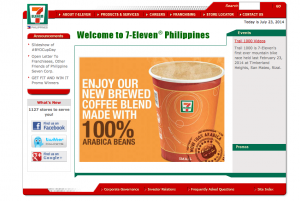
The Department of Trade and Industry has reminded convenience stores to observe the price freeze being implemented in areas placed under a state of calamity as they are not exempt from the mandate of the Price Act. Screengrab from https://www.7-eleven.com.ph/index.php
MANILA, Philippines–The Department of Trade and Industry has reminded convenience stores to observe the price freeze being implemented in areas placed under a state of calamity as they are not exempt from the mandate of the Price Act.
“Convenience stores located within the areas declared under State of Calamity are covered by the price freeze. Prices of basic goods being sold in these stores must be frozen at their prevailing prices,” stressed Trade Undersecretary Victorio Mario A. Dimagiba.
Several areas were placed under state of calamity after Typhoon Glenda (Rammasun) swept through the country last week. These included Muntinlupa City; Obando, Bulacan; Bataan; Laguna; Cavite; Quezon Province; Albay; and Camarines Sur.
The price freeze, which would be effective for 60 days, covered basic necessities such as bread; canned fish and other marine products; potable water in bottles and containers; processed milk; locally manufactured instant noodles; coffee; salt; laundry soap; detergent; and candies, as well as certain basic agricultural items.
Dimagiba, however, clarified that during normal times, convenience stores could sell basic necessities and prime commodities over the suggested retail prices (SRPs) by 10 percent to 15 percent. These retail outlets are allowed higher margins than other store formats due to the higher costs they incur in their operations. Convenience stores operate 24 hours, have limited range of products and therefore, higher cost per peso sale compared with regular supermarkets and groceries.
It can be recalled that in 2011, owners of convenience stores asked the DTI to approve a different pricing level for them, due to these reasons.
Dimagiba has admitted that convenience stores are not part of the list of establishments being monitored by the DTI as these cater mainly to ambulant customers and sell narrower product assortment. As such, they do not significantly affect the market unlike supermarkets, groceries and wet markets which serve as the mainstream go-to places for consumers’ needs.
“For a retail store to be included in the price monitoring, it has to be a major market player that it can cater to most of the demands of the consumers and fill the supply gap to a certain extent during times of calamity. Nevertheless, non-inclusion in the monitoring is not tantamount to exemption from any law and policy, or declaration such as price freeze,” Dimagiba explained.